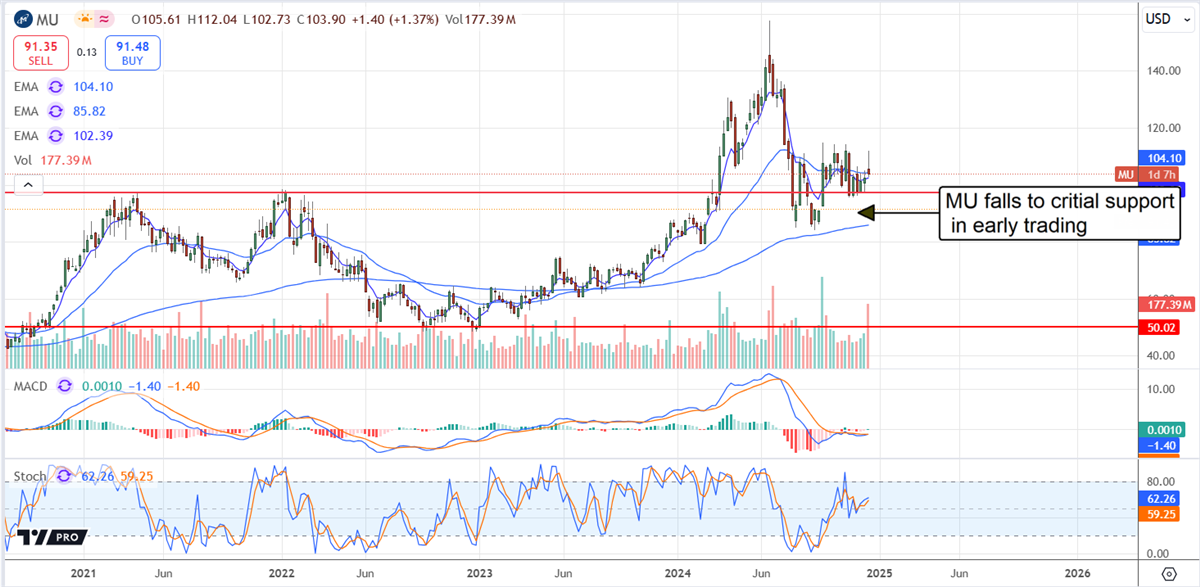Investors interested in Micron Technology (NASDAQ: MU) should cheer the fact that its stock tanked following the FQ1 2025 earnings report. The move is a knee-jerk reaction to mixed results and guidance that point to near-term weakness and long-term strength, driven by its shift to AI.
The legacy business remains a problem for Micron. The global semiconductor inventory reset is taking longer than anticipated due to end markets, including PCs. Still, it is offset by strength in next-gen technologies: Micron’s advanced data center and AI products, including its industry-leading HBM3E memory chips. HBM memory is critical to AI because of the capacity and speed at which it operates. Micron’s HBM3E is the industry's most advanced, delivering significantly better performance with lower energy use, perfect for data centers and AI consumption.
Micron Delivers Mixed Results and Weak Guidance; Forecasts 35% Growth
Micron delivered mixed results and gave weak guidance for Q2, but let’s be fair. The company produced 84% year-over-year (YoY) revenue growth and a wider margin for record results, outperformed on the bottom line, and guided for another 35% YoY growth in Q2. The growth is slowing sequentially and on a YoY basis, but 35%, in addition to last year’s 50% gain, is solid, and the bar was set high. Analysts have been lifting their expectations all year as AI demand and data center business drove strength in peripheral markets such as memory. Given the trends, Micron’s guidance is likely cautious.
Segmentally, DRAM sales grew by 20% sequentially and 86% year over year due to demand for HBM3 and supporting technology. HBM sales more than doubled, and SSD sales were also strong. The company cites a market share gain in the SSD segment and forecasts additional gains in the coming quarters.
Margin news is strong. The company produced a 27.5% adjusted operating margin, 50 basis points better than MarketBeat’s reported consensus, up 500 basis points sequentially, reversing a loss posted in the previous year. The adjusted $1.79 is up significantly from last year’s $0.95 loss and nearly 200 basis points above forecasts. The takeaway is that Micron’s business is sustaining profits and improving profitability, with strengths expected to continue this year, providing positive free cash flow.
Micron Is Investing in Next Gen Technology and Growth
Micron’s balance sheet shows some changes, including a YTD cash reduction. However, the red flags are offset by increased spending on HBM technologies and ramping production to meet demand. The result is that cash is down, but the company remains well-capitalized and is building value for investors. The balance sheet highlights include increased receivables, current, and total assets only partially offset by increased liability. Assets rose by $2.05 billion or about 3%, while liabilities increased by less than $0.5 billion or about 1.5%, leaving equity up by 3.7%. Leverage remains low, with a total liability of about 0.5x equity, leaving the company in a robust financial position capable of executing its plans while paying its dividend.
The Analysts Are Underwhelmed by Micron’s Strong Quarter
The analyst's response to Micron’s results is mixed. The bulk of activity is negative, including numerous price target reductions and a downgrade to Hold from Bank of America. Still, the chatter is optimistic, citing both near-term headwinds and an expectation for strength to improve in the back half of next year when legacy business reverts to growth. And not all of the revisions are negative. Rosenblatt maintained its Buy rating and $250 price target, expecting a 150% stock price increase. The consensus sentiment for Micron is a Moderate Buy, and most analysts see it trading above $110.
The stock price pulled back by 12% in early pre-market trading but may not have much deeper to move. The stock trades at a deep-value level and above critical support at the long-term moving average. There is a risk that Micron could fall below the $85 level, but that is not expected due to the low 11x earnings multiple, strength in results, and long-term outlook for industry-leading results driven by HBM3 demand. The more likely scenario is that this market will regain traction quickly, confirming critical support levels as it rebounds from the post-release lows.

The views and opinions expressed herein are the views and opinions of the author and do not necessarily reflect those of Nasdaq, Inc.



